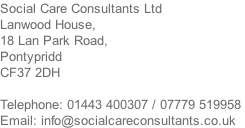


Social Care Consultants Ltd © 2021. All rights reserved | Website by View Web Design

Cost of living crises and social care
In the 21st century the social care sector seems to have always faced funding challenges. But the current circumstances and cost of living crisis place the sector in significant jeopardy. This has resulted in many services struggling to make ends meet and that has a consequential impact on quality-
Know your costs
This seems so simple and is one of the first rules of business. Know what it costs you to deliver a service and make sure that your charges are greater than this and the service will be viable. But many care providers have little idea what it costs them to deliver an hour of homecare or a week of residential/nursing care. They may know what it cost them according to their last accounts, but these costs were many months ago and as we know costs change seemingly by the day at present. So, use your accounting software and produce real time management accounts, calculate what it costs you, compare this to what you are charging and update the cost model when ever any costs change. Even a small increase in the cost of one item of expenditure may have a significant impact on the cost-
Anticipate cost changes
This does not need a crystal ball, but it does need the service to keep an eye on movements in cost and estimate what costs will be in the immediate, medium term (months) and long term (next year) future. Creating a costing model which can determine the impact of say 20% increase in insurance costs will enable a more robust financial platform from which to build a business. The service must remember to factor in and model a decrease in business from loss of clients. This can be due to many factors such as deaths but can also be a consequential impact of a deterioration in quality-
Ask yourself-
There are many things that businesses like to have, there are even more things that salespeople are adept at convincing us are absolutely essential. The hard fact is that everything you spend money on must earn its keep. The latest software will only provide a return on investment if your team know how to use it and it delivers the promised efficiencies. There are so many stories of care providers being sold on the latest rostering software or electronic care planning system and then failing to get any real benefit as they didn’t fully grasp how to use it, underestimated the time it takes to set it up and even worse, trusted the results implicitly.
Talk to people about your costs
Talking about finances are a challenge for some, but in business it is essential. A care business will often keep its costs from the staff team because they are concerned that the staff may leave if they think that the business is hard up or will want a pay rise if they think that the business if making a profit. Care providers also need to be honest with clients such as local authority commissioners and self-
Manage suppliers
Care providers must recognise that suppliers are facing the same pressures and they will have to increase costs from time to time. Changing suppliers may bring short term cost reductions but in most cases ends up costing more in the long term due to different quality of service/product. Talking to suppliers and keeping a close eye on usage ensures both value for money and return on investment.
Look after your stuff
A skip full of damaged equipment is common sight outside many care homes. Some of this will be equipment that came to end of its life. But most is damaged because it was of poor quality of due to misuse. That skip is full of money, money that was expended to buy the equipment in the first place, equipment that somebody broke and now costs even more money to replace. In fact, it costs money to even dispose of it as the costs of waste removal keeps increasing too. If only people knew the cost of the equipment and looked after it like it were the valuable item it is, then care providers would not spend so much on replacement and repair. Another drain on costs is equipment that is not used, an example would be the many items of PPE that are never used because they languish in a carer’s car or care home staff room.
Focus on return on investment from your team
Social care provision is a team game, everybody needs to contribute and do so effectively and efficiently. Some team members contribute by direct service provision, others contribute by performing functions which enable those providing direct service provision to function. It is easy to determine the return on the investment in those providing direct service provision, but it is less easy to do so for those providing support functions. Care providers need to focus on the actual tasks the person undertakes, how long those tasks take and whether they contribute a return on investment. A manager who does not ensure that the service is at least compliant with the regulations is not effective and has not contributed to a return on investment. A quality manager who does not drive improvements in both quality and efficiency is just not effective. These may be harsh words, but it is harsh world these days and if care services are to survive they need to be lean and effective.
Cost control not fee increases are the route to survival for social care providers
If you have read this far, you will have noted that this article does not suggest going cap in hand to fee payers asking for increases in fees. That is because care services must ensure that their house is in order, costs under control and know their numbers before asking for increased fees. Any increase in fees must be justified, the government does not have a bottomless pit of money despite what the politicians say. We the public pay for social care via our taxes and unless we all agree to pay more tax there is just no more money. Cost control is the only way to survive the current situation.




















